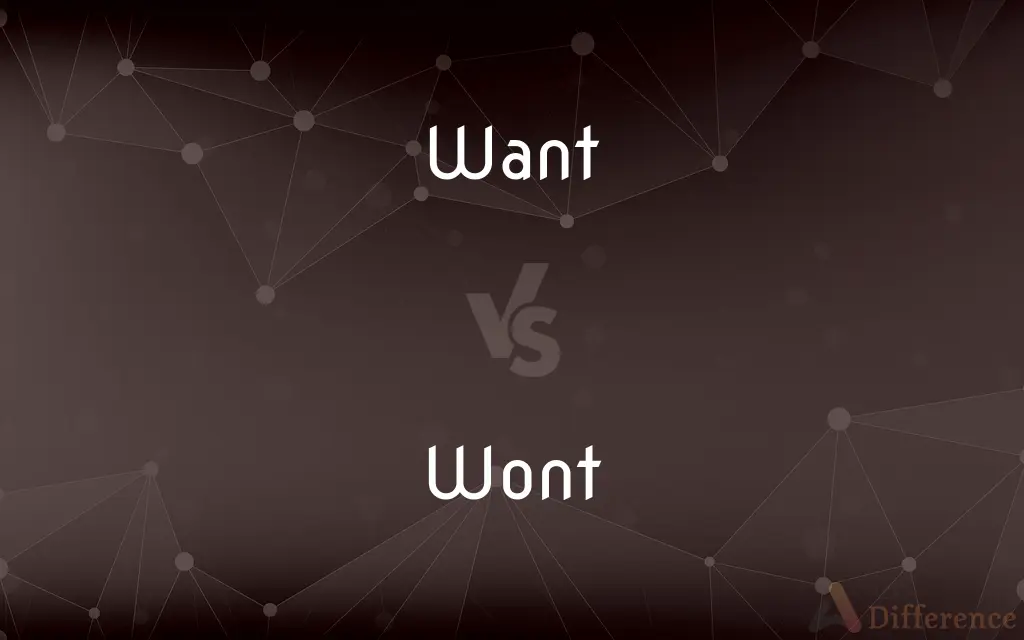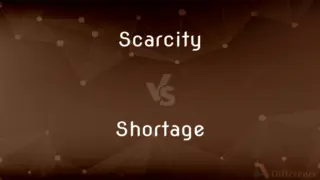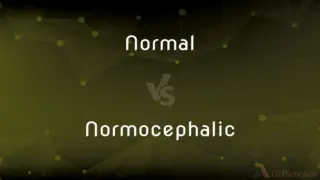Want vs. Wont — What's the Difference?
Edited by Tayyaba Rehman — By Maham Liaqat — Updated on March 28, 2024
Want expresses a desire or need for something, whereas wont indicates a customary habit or practice.

Difference Between Want and Wont
Table of Contents
ADVERTISEMENT
Key Differences
Want refers to the feeling of desiring or needing something, often emphasizing a lack or deficiency that one aims to fill. On the other hand, wont is a term used to describe a habitual practice or behavior, signifying something that one is accustomed to doing.
While "want" is primarily used to express desires, aspirations, or requirements, highlighting a forward-looking intention or need, wont, as a noun, encapsulates established habits or tendencies, reflecting past and ongoing actions.
In terms of usage, "want" is a verb that actively seeks to acquire or achieve something, indicating a pursuit or aspiration. Conversely, "wont" is used as a noun (less commonly as an adjective) in the context of habitual actions, often linked to personal or cultural traditions.
The emotional resonance of "want" is tied to feelings of longing, need, or desire, which can motivate behavior and decisions. Wont, however, is more neutral, describing a state of being accustomed to certain behaviors without necessarily invoking emotional weight.
Grammatically, "want" can take direct objects and be used in various tenses to denote current, future, or hypothetical desires. Wont, being less flexible, is usually fixed in form, mainly appearing in expressions that describe habitual behavior.
ADVERTISEMENT
Comparison Chart
Definition
A desire or need for something
An accustomed way of behavior or practice
Part of Speech
Verb (primarily)
Noun (primarily), Adjective (less common)
Usage Example
"I want to travel the world."
"She is wont to wake up early."
Emotional Resonance
Often implies a sense of longing or necessity
Neutral, indicating habit without emotional implication
Flexibility in Use
Versatile, used in various tenses
Relatively fixed, mainly describing habitual actions
Compare with Definitions
Want
Desire.
I want to learn a new language this year to enhance my communication skills.
Wont
Custom.
It is his wont to take a long walk after dinner.
Want
Need.
We want more volunteers to help with the community garden.
Wont
Established Routine.
Making tea in the morning is an old wont of mine.
Want
Requirement.
To enter the contest, you want a submission by the end of the month.
Wont
Tendency.
He is wont to forget names easily.
Want
Aspiration.
She wants to become a doctor to help others.
Wont
Usual Behavior.
Waking up at dawn was her wont, even on weekends.
Want
Longing.
He wants for a chance to prove his capabilities.
Wont
Habitual Practice.
They are wont to have dinner precisely at 7 PM.
Want
The idea of want can be examined from many perspectives. In secular societies want might be considered similar to the emotion desire, which can be studied scientifically through the disciplines of psychology or sociology.
Wont
One's customary behaviour
Constance, as was her wont, had paid her little attention
Want
Have a desire to possess or do (something); wish for
We want to go to the beach
She wanted me to leave
I'll give you a lift into town if you want
I want an apple
Wont
(of a person) in the habit of doing something; accustomed
He was wont to arise at 5.30 every morning
Want
Should or need to do something
You don't want to believe everything you hear
Wont
Make or be or become accustomed
Sons wont to nurse their Parents in old age
Wont thy heart to thoughts hereof
Want
Lack something desirable or essential
You shall want for nothing while you are with me
Wont
Accustomed or used
"The poor man is wont to complain that this is a cold world" (Henry David Thoreau).
Want
A lack or deficiency of something
For want of a better location we ate our picnic in the cemetery
Victorian houses which are in want of repair
Wont
Likely
Chaotic as holidays are wont to be.
Want
A desire for something
The expression of our wants and desires
Wont
Customary practice; usage.
Want
To have a strong feeling to have (something); wish (to possess or do something); desire greatly
She wants a glass of water. They want to leave.
Wont
To make accustomed to.
Want
To desire (someone to do something)
I want you to clean your room.
Wont
To be in the habit of doing something.
Want
To request the presence or assistance of
You are wanted by your office.
Wont
(archaic) One's habitual way of doing things; custom, habit, practice.
He awoke at the crack of dawn, as was his wont.
Want
To seek with intent to capture
The fugitive is wanted by the police.
Wont
Accustomed or used (to or with a thing), accustomed or apt (to do something).
He is wont to complain loudly about his job.
Want
To have an inclination toward; like
Say what you want, but be tactful.
Wont
To make (someone) used to; to accustom.
Want
(Informal) To be obliged (to do something)
You want to be careful on the ice.
Wont
To be accustomed (to something), to be in the habit (of doing something).
Want
To be in need of; require
"'Your hair wants cutting,' said the Hatter" (Lewis Carroll).
Wont
Using or doing customarily; accustomed; habituated; used.
If the ox were wont to push with his horn.
Want
To be without; lack.
Wont
Custom; habit; use; usage.
They are . . . to be called out to their military motions, under sky or covert, according to the season, as was the Roman wont.
From childly wont and ancient use.
Want
To be inclined or desirous; wish
Call me daily if you want.
Wont
To be accustomed or habituated; to be used.
A yearly solemn feast she wont to make.
Want
The condition or quality of lacking something usual or necessary
Stayed home for want of anything better to do.
Wont
To accustom; - used reflexively.
Want
Pressing need; destitution
Lives in want.
Wont
An established custom;
It was their habit to dine at 7 every evening
Want
Something desired
A person of few wants and needs.
Wont
A pattern of behavior acquired through frequent repetition;
She had a habit twirling the ends of her hair
Long use had hardened him to it
Want
A defect of character; a fault.
Want
(transitive) To wish for or desire (something); to feel a need or desire for; to crave or demand.
What do you want to eat?
I want you to leave.
Never wanted to go back to live with my mother.
Want
(by extension) To make it easy or tempting to do something undesirable, or to make it hard or challenging to refrain from doing it.
The game developers of Candy Crush want you to waste large, copious amounts of your money on in-game purchases to buy boosters and lives.
Depression wants you to feel like the world is dark and that you are not worthy of happiness. The first step to making your life better from this day forward is to stop believing these lies.
Want
To wish, desire, or demand to see, have the presence of or do business with.
Ma’am, you are exactly the professional we want for this job.
Danish police want him for embezzlement.
Want
(intransitive) To desire (to experience desire); to wish.
You can leave if you want.
Want
To lack and be in need of or require (something, such as a noun or verbal noun).
That chair wants fixing.
Want
To have occasion for (something requisite or useful); to require or need.
Want
To be lacking or deficient or absent.
There was something wanting in the play.
Want
To be in a state of destitution; to be needy; to lack.
The paupers desperately want.
Want
To lack and be without, to not have (something).
She wanted anything she needed.
Want
To lack and (be able to) do without.
Want
(countable) A desire, wish, longing.
Want
Lack, absence, deficiency.
A want of sense.
Want
(uncountable) Poverty.
Want
Something needed or desired; a thing of which the loss is felt.
Want
A depression in coal strata, hollowed out before the subsequent deposition took place.
Want
(dialectal) A mole (Talpa europea).
Want
The state of not having; the condition of being without anything; absence or scarcity of what is needed or desired; deficiency; lack; as, a want of power or knowledge for any purpose; want of food and clothing.
And me, his parent, would full soon devourFor want of other prey.
From having wishes in consequence of our wants, we often feel wants in consequence of our wishes.
Pride is as loud a beggar as want, and more saucy.
Want
Specifically, absence or lack of necessaries; destitution; poverty; penury; indigence; need.
Nothing is so hard for those who abound in riches, as to conceive how others can be in want.
Want
That which is needed or desired; a thing of which the loss is felt; what is not possessed, and is necessary for use or pleasure.
Habitual superfluities become actual wants.
Want
A depression in coal strata, hollowed out before the subsequent deposition took place.
Want
To be without; to be destitute of, or deficient in; not to have; to lack; as, to want knowledge; to want judgment; to want learning; to want food and clothing.
They that want honesty, want anything.
Nor think, though men were none,That heaven would want spectators, God want praise.
The unhappy never want enemies.
Want
To have occasion for, as useful, proper, or requisite; to require; to need; as, in winter we want a fire; in summer we want cooling breezes.
Want
To feel need of; to wish or long for; to desire; to crave.
I want to speak to you about something.
Want
To be absent; to be deficient or lacking; to fail; not to be sufficient; to fall or come short; to lack; - often used impersonally with of; as, it wants ten minutes of four.
The disposition, the manners, and the thoughts are all before it; where any of those are wanting or imperfect, so much wants or is imperfect in the imitation of human life.
Want
A state of extreme poverty
Want
The state of needing something that is absent or unavailable;
There is a serious lack of insight into the problem
Water is the critical deficiency in desert regions
For want of a nail the shoe was lost
Want
Anything that is necessary but lacking;
He had sufficient means to meet his simple needs
I tried to supply his wants
Want
A specific feeling of desire;
He got his wish
He was above all wishing and desire
Want
Feel or have a desire for; want strongly;
I want to go home now
I want my own room
Want
Have need of;
This piano wants the attention of a competent tuner
Want
Wish or demand the presence of;
I want you here at noon!
Want
Hunt or look for; want for a particular reason;
Your former neighbor is wanted by the FBI
Uncle Sam wants you
Want
Be without, lack; be deficient in;
Want courtesy
Want the strength to go on living
Flood victims wanting food and shelter
Common Curiosities
How do "want" and "wont" differ grammatically?
"Want" is primarily a verb, and "wont" is mainly used as a noun.
Can "want" indicate a lack of something?
Yes, it often highlights the absence of something desired or required.
Can "wont" be used as an adjective?
Yes, though less commonly, it can describe something done according to habit.
Can "want" be satisfied?
Yes, through acquiring or achieving what is desired or needed.
How is "wont" used in a sentence?
Wont describes habitual behavior or practices, often used as "is wont to."
What does "want" mean?
Want signifies a desire, need, or requirement for something.
Can "want" express both material and immaterial desires?
Yes, it can indicate the longing for both tangible objects and intangible outcomes.
Is "wont" commonly used in modern English?
While less common today, "wont" is still used to describe customary habits or practices.
How does "want" influence behavior?
It can motivate actions towards achieving or acquiring the desired object or state.
Is there an emotional difference between "want" and "wont"?
"Want" can evoke feelings of longing or need, while "wont" is neutral, indicating habit.
How does context affect the use of "want" and "wont"?
Context determines whether "want" is expressing desire or need, while "wont" relates to habitual actions.
What are synonyms for "want"?
Desire, need, wish, crave, and yearn are some synonyms.
Is "wont" always positive?
Not necessarily; it simply describes a habit, which can be positive, negative, or neutral.
What are synonyms for "wont"?
Habit, custom, practice, routine, and tradition serve as synonyms.
How is "wont" related to culture?
It can reflect cultural practices and traditions through habitual actions.
Share Your Discovery

Previous Comparison
Scarcity vs. Shortage
Next Comparison
Normal vs. NormocephalicAuthor Spotlight
Written by
Maham LiaqatEdited by
Tayyaba RehmanTayyaba Rehman is a distinguished writer, currently serving as a primary contributor to askdifference.com. As a researcher in semantics and etymology, Tayyaba's passion for the complexity of languages and their distinctions has found a perfect home on the platform. Tayyaba delves into the intricacies of language, distinguishing between commonly confused words and phrases, thereby providing clarity for readers worldwide.















































